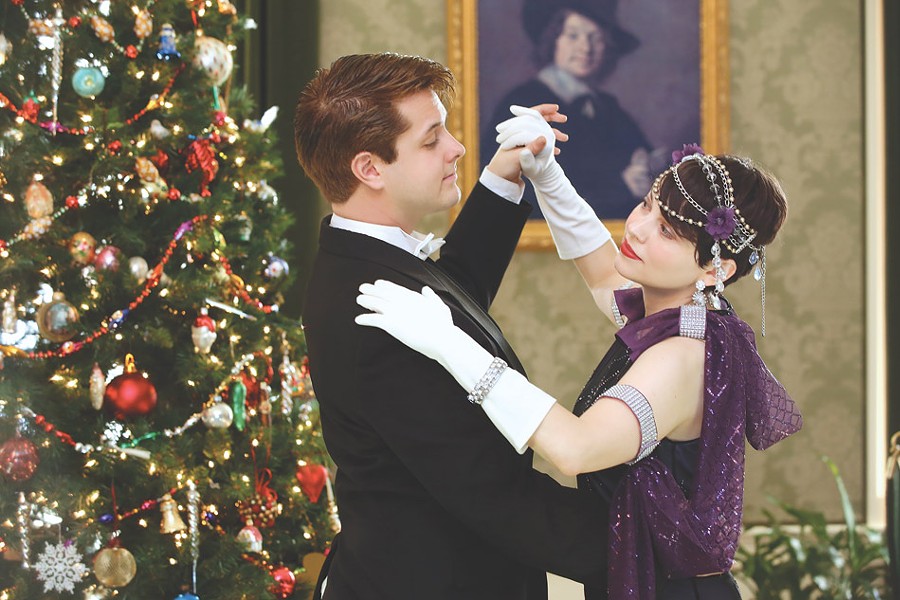It's an often overlooked fact that playwright Philip Barry (best known for "The Philadelphia Story") was a Rochester native. But this weekend and next, Screen Plays -- a local group that specializes in stage versions of Hollywood's Golden Age films -- brings to life one of Barry's more popular works, "Holiday."
The plot follows Johnny Case, a corporate lawyer who has fallen in love with socialite Julia Seton during a holiday trip in Lake Placid and proposed to her after just 10 days. The pair returns to Manhattan before New Year's Eve 1928 to tell Julia's father, and Johnny soon realizes the extent of his fiancée's wealth and social status. As the story unfolds, the young lovers learn more about one another through the lens of family relationships and material possessions.
Barry was known for works that featured a character who wanted a life outside the norm; his plays are full of wanderers, idealists, and bon vivant types -- influenced, no doubt, by the year he spent in France among artists like F. Scott and Zelda Fitzgerald, Ernest Hemingway, and Cole Porter. Barry also wrote many splendid roles for women, and his friend Katharine Hepburn portrayed leads in the film adaptations of both "The Philadelphia Story" and "Holiday" (opposite Jimmy Stewart and Cary Grant, respectively).
Screen Plays' shows, which are produced by Karen Tuccio, draw from a wide level of talent and skill within the community theater circles in town, but "Holiday" is perhaps the strongest ensemble they've assembled yet. Director Jean Gordon Ryon (Geva's resident dramaturg by day) provides thoughtful, contextual direction, guiding the actors through Jazz Age slang and witty repartee so familiar to high society circles in the 1920's.
A host of young actors lead the 12-person cast. Sammi Cohen (as Julia Seton) and Sean Michael Smith (Johnny Case) open the show as the young lovers, reuniting in Manhattan after their holiday trip. It's a syrupy first scene that demands the audience assume a certain level of precluded romance, but Cohen and Smith pull it off admirably, and they both settle strongly into their individual roles as the show progresses. Marcy J. Savastano (Linda Seton) plays Julia's free-spirited younger sister, and Tyler Lucero (Ned Seton) is the alcoholic younger brother. True to real life, the three siblings couldn't be more different in personality -- but all share the same family skeletons. Lucero's character demands an air of drunken wisdom throughout much of the show, and he delivers splendidly. Savastano is a starlet -- she has Hepburn's role -- and though her mannerisms belie her as the "younger sister" to Cohen's Julia, she has the wit and stage presence to capture the audience throughout the two-and-a-half-hour show. Bill Alden (Edward Seton), who plays the father of the three, portrays a frighteningly stern character and masters a believable dynamic with each of his adult children.
Kevin Sean Sweeney (Nick) and Nancy K. Fancher (Susan) lighten the show considerably as the gallivanting, fun loving Potters. With the duo's sweet onstage chemistry, unexpected dance routines and strong characterization, each scene that featured them was a treat. The cast is rounded out by several more supporting roles -- the maid and butlers who perform each set change in character make the most of their stage time -- each one contributing to the strong ensemble. The music throughout the show is also worth a mention: the program notes original recordings from the personal collection of Peter J. Doyle, and the selections set the mood beautifully, from interlude to underscore. The costume design by Shelly Stam, likewise, hearkens back to the days of flapper-inspired bob haircuts, elaborate New Year's Eve frocks, and smoking jackets.
It's refreshing to see Screen Plays pay homage to not only a son of Rochester, but also a gifted, influential playwright. Overall, "Holiday" is an entertaining trip back in time, sure to delight fans of similar period pieces such as "The Great Gatsby" and "Downton Abbey" -- but it has a levity to its plot that will leave audience members thinking about the choices they've made in love, the time they've invested in work, and the money they've spent along the way.
